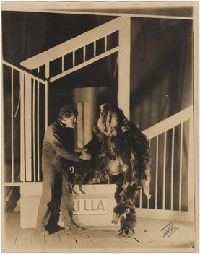The hairy ape as an expressionistic play
Expressionism was first used by painter Julian Auguste Harve in 1901, while trying to distinguish his paintings from Impressionism. Expressionist movement in art was initiated in Germany in early 20th century under the influence of Swedish Playwright Strindberg. It was at its height between 1910- 1925, just before, during and after the World War-I. In America, Expressionism made a strong impact on the plays of Eugene O'Neill such as ' The Emperor Jones, The Hairy Ape and The Great God Brown. The Hairy ape is the first expressionist play in America.
The term Expressionism means expression of inner reality through outer symbols. As a dramatic movement expressionism began in 1916 and continued to flourish in Europe until around 1924. O’Neill imported it from Germany. Strindberg was the father of the expressionistic drama. Expressionism in drama is what the stream-of-consciousness is in fiction. It is the expression of the dream state. Formlessness, disorder, protests are its major features. Traditional story-element and plot-construction are rejected in favour of psychological reality. Characters are mere symbolic types; there is no traditional division of drama in acts; clock time is broken; there is a fusion of the present, future and past.
Expressionistic writers are not optimistic due to their bitter experience resulted in world war. Expressionistic art tries to project the shock of unfortunately being alive in the cruel modern world.
M.H.Abram remarks that:
“The central feature of Expressionism is a radical revolt against realism. Instead of representing the world as it objectively, the author undertakes to express inner experience by representing the world as it appears to his state of mind. Often the work implies that mental condition is representative of anxiety-ridden modern man in an industrial and technological society which is drifting toward chaos”.
It is a radical revolt against the artistic and literary tradition of realism. The Expressionistic playwright undertakes to express a personal vision of human life and human society. Drama was a prominent and widely influential form of expressionistic writing. Expressionism, the name itself suggests that the writer does not use more action on the stage but he uses minimum dialogues, and minimum characters to express his inner bent of mind. The action is less important but he believes in the expression of the characters. It is a dramatic technique which enables a playwright to depict the inner psyche or inner reality of a character. Basically, it is a very difficult task to portray someone's inner mind but through skilful use of expressionism one can perform the task very meticulously. Instead of dramatic sequence of events, expressionists concentrate on portraying the inner mind are how it works. The prominent playwrights of Expressionism are Georg Kaiser (German), Ernest Toller, Eugene O'Neill and Elmer Rice.
Among all the expressionistic playwrights, Eugene O'Neill is regarded to be the most outstanding playwright.
Several features of expressionism are discernible in the modern drama The Hairy Ape. The central figure in the play is Yank, representing all the human beings belong to the working class in the modern age. In Expressionistic play, much emphasis has been given on the central figure and minor characters seem to be secondary. Before Yank who is protagonist, Paddy, long, the secretary of I.W.W. is nothing but nameless entities. Yank, the central figure goes to the secretary of the I.W.W. and the other people in its office are equally lacking in individuality. The situation enables the dramatist to focus on the obsession of Yank and what goes in his inner mind.
The
use of the dramatic techniques like exaggerated gestures,
disturbing
colours, sounds and movements and repetition are significant ingredients of an expressionistic drama. The playwright lays
focus on the suffering and anguished soul of the central character through 'interior monologue'.
Yank’s deep disturbing thought about Mildred's word 'a filthy beast' continues in his mind throughout the play, which creates a feeling of indignation and gives rise to aversion against the elite society. The inner brooding in his mind is the part of the psychological state of mind. It is not the inner reality of the Yank but the disintegration of all modern human beings.
Yank suffers from inner emptiness, isolation and a feeling of insecurity. He is in search of his own identity throughout the play says; “Oh! God where do I belong?” Yank got alienated from the society and tries to take revenge on that rejected society. After his disappointment from the whole materialistic world, he finds a gorilla and thinks that even animal can realize his dislike against the society. On the contrary, Gorilla crushes him to death and monkey's in the other cages applause for the victory of the animal.
Strindberg admired Eugene O'Neill's 'expressionist' dramatic style of distortion of action, speech and scene of the play.
Thus, the expressionists did not want to represent mankind strugglling with outside forces rather they thought to dramatise man's struggle with himself. As Edward Albert remarks, “Expressionistic drama was not concerned with society but with man”.


No comments:
Post a Comment
looking forward your feedbacks in the comment box.